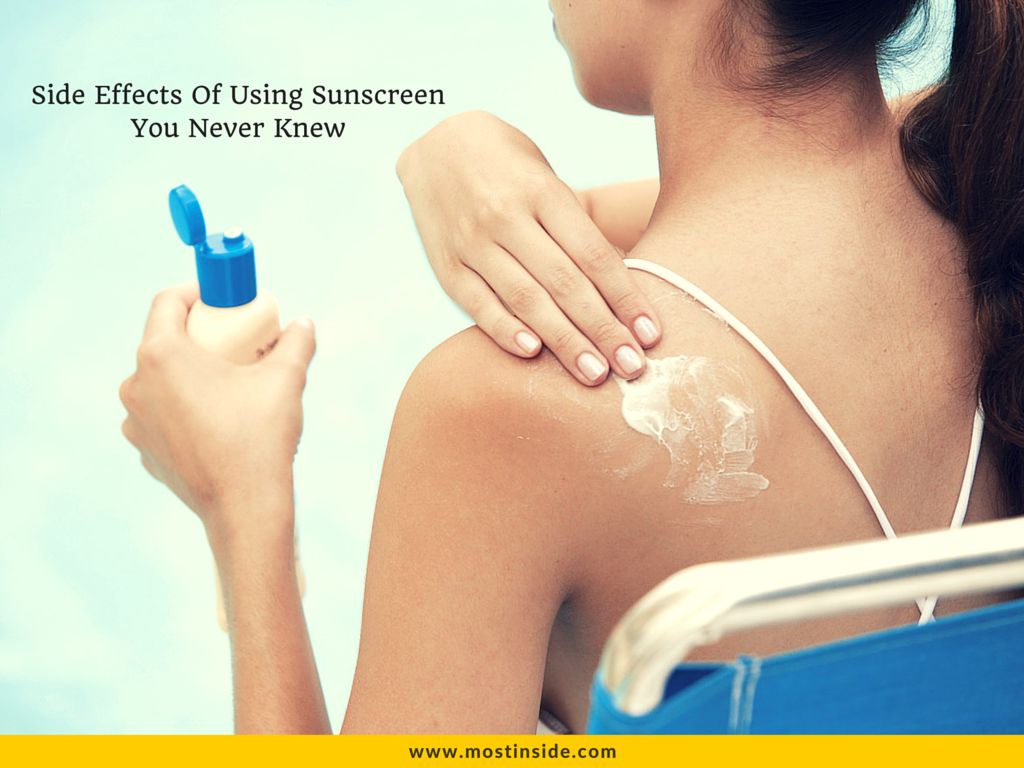6 Side Effects Of Using Sunscreen You Never Knew

Though sun is the only major source of vitamin D, but exposure to sun means exposure to harmful rays that can have retrogressive effects on the skin apart from tanning. In recent years, more and more people have started using sunscreens for protection against harmful UVA and UVB rays emitting from the sun and it has become essential to prevent sunburns, pre-mature skin ageing and skin cancers. But these sunscreens are actually loaded with numerous chemicals that can be hazardous to the skin. Prolonged usage can even cause permanent skin damage.
Choosing the right kind of sunscreen made from skin friendly ingredients is as essential as following these application instructions:
- Apply the sunscreen on the skin that will be exposed to the sun.
- Apply 30 minutes before stepping in the sun.
- Apply again after washing face, swimming or sweating.
- One SPF (Sun Protection Factor) = 15 minutes. So wisely choose a sunscreen and count the time for re-application.
Even after following the instructions strictly, you may be impacted by the side effects of sunscreen due to the harmful chemical combinations that may be unsuitable for your skin type. So before using your sunscreen again, read these 6 side effects of using sunscreen you never knew and carefully choose your next sunscreen brand:-
-
May Cause Pain & Irritation In Hairy Areas
The markets are filled with numerous sunscreens endorsed by popular people and you hardly find it easy to pick a brand for you as all of them are pitched perfectly. Moreover, the availability of variety of sunscreens in the form of ointments, gels, lotions, sprays, creams, etc adds to the dilemma. Though it is your discretion as to which variety you wish to use, but remember that sprays, ointments and even sunscreen creams can cause severe rashes or irritation in the hairy areas. Generally it is the gel sunscreen that is best suitable for all skin types.
-
Unsuitable For Skin Suffering From Acne
Skin suffering from acne generally is more sensitive and susceptible to suffer from severe redness, rashes, blisters, etc., as the chemicals used in sunscreen may not be designed to suit this skin condition. It is better to use non-comedogenic and non-oily sunscreens advised by your dermatologist so that your skin condition doesn’t get worse. Also make sure that the sunscreens made for body is not applied on face as they are too heavy for the facial skin, which is more sensitive in comparison to the body skin.
-
Allergic Skin Reactions
Most sunscreens are manufactured using many chemicals that may not be suitable for everyone. They can cause mild to severe skin irritation, swelling, redness, itching or even rashes that may need immediate medical attention. Most of these chemicals are used to add fragrances and to increase the sunscreen’s shelf life. Recently it was known after many medical studies that sunscreens contain PABA chemical that has caused high number of skin allergies and thereby, many popular sunscreen brands have started eliminating its use.
The next time you intend to purchase a sunscreen, opt for hypoallergenic ones as they don’t contain PABA and other chemicals that have the risk of causing allergies. In case, you are not sure if your skin will respond well to any sunscreen brand, then ask your dermatologist to suggest a brand suitable for your skin type and get a patch test done too.
Recommended: 10 Amazing Reasons To Get More Sunlight For Better Health
-
Increased Breast Cancer Risk
The chemicals used in sunscreen can not only be harmful on the skin in form of allergies but can also lead to breast cancer. Medical experts have revealed that some peculiar chemicals found in sunscreens have estrogenic effects on the breast cancer cells. Some of the chemicals can even have adverse impacts on the blood estrogen levels. You must abstain from using high chemical induced sunscreens on children as their skin tends to absorb these chemicals quickly.
-
Irritation In The Eyes
After applying sunscreen, if you step in the sun and sweat a lot, then the sweat can push the sunscreen into your eyes and it can cause irritation and intense pain. You may even feel burning sensation and temporary sensitivity to light. Some sunscreens packed with heavy chemicals can even cause blindness. So the next time, your sunscreen reaches the eye, rinse well with cold water and if burning or redness persists, consult the doctor immediately.
-
Can Cause Pus In Hair Follicles
While applying sunscreen on your face, you must ensure that your hair follicles above the forehead doesn’t come in contact with the sunscreen. Hair follicles at the starting of the scalp may get sweaty, greasy and dirty sooner. Many sunscreens when reach this area of the scalp, they tend to create small, reddish blisters that eventually becomes filled with pus. This can lead to serious infection too.
Therefore, while purchasing sunscreen you must be very cautious about the ingredients and even must be used as per instructions. If you are feeling itching sensation or redness, then wash off your face and stop using that sunscreen. Take advise from your doctor as to which sunscreen will be suitable for your skin type. If you are outside for longer duration, then don’t forget to re-apply. If you have oily skin, then use non-comedogenic and non-oily sunscreen, preferably in gel form. In case, you are buying sunscreen for children, then ensure that you purchase after consultation with the doctor.
Recommended: How Getting Naked More Often Can Help You?
Recommended For You
A Guide to Hair Extensions
Snehashree Bhat
A young writer who loves to pen words from creative perspective. Passionate internet surfer, a versatile homemaker and a person who finds pleasure in adopting healthier and positive changes in her persona. An enthusiastic feminist who wishes to make serious changes in the stereotypical thought process of the society via the voice of her words.




